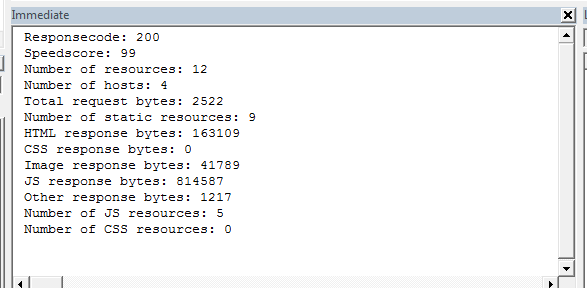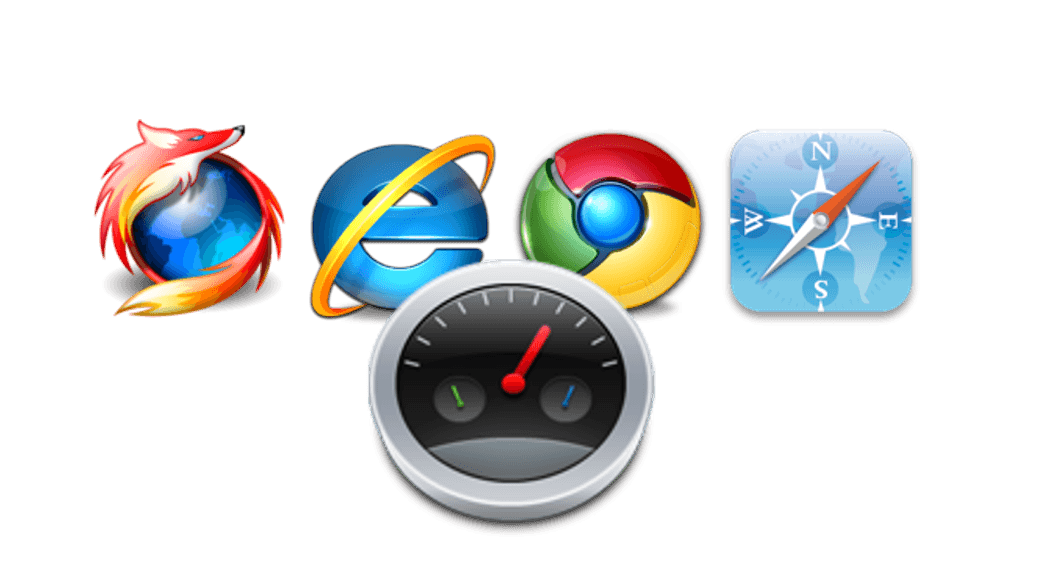Google API are very useful and easy to use. Especially since queries are sent via GET and results are provided in JSON which is easy to scrape, from which data can be easily extracted. I always like to play with Google API as Google has such a vast range of different API addressing almost any area of the Internet.
From time to time I intend to share different examples of uses of the Google API using VBA as I think it may be of particular interest to some of my audiences. So let’s jump right in to the VBA PageSpeed guide.
What is the Google PageSpeed Insights API?
The Google PageSpeed Insights API runs an analysis on the page at the specified URL, and returns:
- PageSpeed scores
- Information on the URL resources (JS, CSS images)
- Lists suggestions to make that page faster, and other information.
As you can see this information may be of particular interest to SEO experts, website admins or just a regular blogger like myself. There are literally multitudes of websites out living off this single Web API by sharing SEO and website stats with their users. Why use the middle man when you can easily use this Web API call yourself, and more easily even in Excel!
If you want to play around with the Google PageSpeed Insights API directly go here:
https://developers.google.com/apis-explorer/#p/pagespeedonline/v2/pagespeedonline.pagespeedapi.runpagespeed
The code (VBA PageSpeed)
Let’s start with defining some useful objects we will need for the procedure:
Enum Strategy
Desktop
Mobile
End Enum
Type PageSpeed
responseCode As Long
speedScore As Long
'PageStats
pageStats_numberResourses As Long
pageStats_numberHosts As Long
pageStats_totalRequestBytes As Long
pageStats_numberStaticResources As Long
pageStats_htmlResponseBytes As Long
pageStats_cssResponseBytes As Long
pageStats_imageResponseBytes As Long
pageStats_javascriptResponseBytes As Long
pageStats_otherResponseBytes As Long
pageStats_numberJsResources As Long
pageStats_numberCssResources As Long
End Type
Strategy – this enumeration lists the two possible options. Mobile – analyzing the URL for mobile devices, and Desktop – analyzing the URL for desktop devices. Pretty straightforward.
PageSpeed – this is the (partial) result of the API call. In this example I am only extracting the general pagespeed information like:
- Response code – read here how to interpret these codes. Generally you would prefer this to be 200 (OK)
- Speed Score – how well the URL scores in terms of speed. Read more here.
- Other – number of page resources, JS/CSS/image files etc.
I intentionally ignored the other tons of info provided by the Google PageSpeed API response. You can always extract this data yourself by building up the VBA code and creating a regular expression that will match what you need.
The GetPageSpeed function
Public Function GetPageSpeed(url As String, analysisStrategy As Strategy, filterThirdPartyResources As Boolean) As PageSpeed
Dim callURL As String, pageSpeedRes As PageSpeed, objHTTP As Object
callURL = "https://www.googleapis.com/pagespeedonline/v2/runPagespeed?url=http%3A%2F%2F" & url & "&filter_third_party_resources=" & IIf(filterThirdPartyResources, "true", "false") & "&strategy=" & IIf(analysisStrategy = Desktop, "desktop", "mobile")
Set objHTTP = CreateObject("MSXML2.ServerXMLHTTP")
objHTTP.Open "GET", callURL, False
objHTTP.setRequestHeader "User-Agent", "Mozilla/4.0 (compatible; MSIE 6.0; Windows NT 5.0)"
objHTTP.send ("")
If InStr(objHTTP.responseText, """SPEED""") = 0 Then GoTo ErrorHandl
'---Extract PageSpeed results---
On Error Resume Next
Dim regex As Object: Set regex = CreateObject("VBScript.RegExp"): regex.Global = False
regex.Pattern = """responseCode"".*?([0-9]+)": Set matches = regex.Execute(objHTTP.responseText)
pageSpeedRes.responseCode = CLng(matches(0).SubMatches(0))
regex.Pattern = """score"".*?([0-9]+)": Set matches = regex.Execute(objHTTP.responseText)
pageSpeedRes.speedScore = CLng(matches(0).SubMatches(0))
regex.Pattern = """numberResources"".*?([0-9]+)": Set matches = regex.Execute(objHTTP.responseText)
pageSpeedRes.pageStats_numberResourses = CLng(matches(0).SubMatches(0))
regex.Pattern = """numberHosts"".*?([0-9]+)": Set matches = regex.Execute(objHTTP.responseText)
pageSpeedRes.pageStats_numberHosts = CLng(matches(0).SubMatches(0))
regex.Pattern = """totalRequestBytes"".*?([0-9]+)": Set matches = regex.Execute(objHTTP.responseText)
pageSpeedRes.pageStats_totalRequestBytes = CLng(matches(0).SubMatches(0))
regex.Pattern = """numberStaticResources"".*?([0-9]+)": Set matches = regex.Execute(objHTTP.responseText)
pageSpeedRes.pageStats_numberStaticResources = CLng(matches(0).SubMatches(0))
regex.Pattern = """htmlResponseBytes"".*?([0-9]+)": Set matches = regex.Execute(objHTTP.responseText)
pageSpeedRes.pageStats_htmlResponseBytes = CLng(matches(0).SubMatches(0))
regex.Pattern = """cssResponseBytes"".*?([0-9]+)": Set matches = regex.Execute(objHTTP.responseText)
pageSpeedRes.pageStats_cssResponseBytes = CLng(matches(0).SubMatches(0))
regex.Pattern = """imageResponseBytes"".*?([0-9]+)": Set matches = regex.Execute(objHTTP.responseText)
pageSpeedRes.pageStats_imageResponseBytes = CLng(matches(0).SubMatches(0))
regex.Pattern = """javascriptResponseBytes"".*?([0-9]+)": Set matches = regex.Execute(objHTTP.responseText)
pageSpeedRes.pageStats_javascriptResponseBytes = CLng(matches(0).SubMatches(0))
regex.Pattern = """otherResponseBytes"".*?([0-9]+)": Set matches = regex.Execute(objHTTP.responseText)
pageSpeedRes.pageStats_otherResponseBytes = CLng(matches(0).SubMatches(0))
regex.Pattern = """numberJsResources"".*?([0-9]+)": Set matches = regex.Execute(objHTTP.responseText)
pageSpeedRes.pageStats_numberJsResources = CLng(matches(0).SubMatches(0))
regex.Pattern = """numberCssResources"".*?([0-9]+)": Set matches = regex.Execute(objHTTP.responseText)
pageSpeedRes.pageStats_numberCssResources = CLng(matches(0).SubMatches(0))
Set regex = Nothing: Set objHTTP = Nothing
'---Return result---
GetPageSpeed = pageSpeedRes
Exit Function
ErrorHandl:
End Function
Ok. Now let’s put it to the test:
Sub TestPageSpeed()
Dim res As PageSpeed
res = GetPageSpeed("www.google.com", Desktop, True)
Debug.Print "Responsecode: " & res.responseCode
Debug.Print "Speedscore: " & res.speedScore
Debug.Print "Number of resources: " & res.pageStats_numberResourses
Debug.Print "Number of hosts: " & res.pageStats_numberHosts
Debug.Print "Total request bytes: " & res.pageStats_totalRequestBytes
Debug.Print "Number of static resources: " & res.pageStats_numberStaticResources
Debug.Print "HTML response bytes: " & res.pageStats_htmlResponseBytes
Debug.Print "CSS response bytes: " & res.pageStats_cssResponseBytes
Debug.Print "Image response bytes: " & res.pageStats_imageResponseBytes
Debug.Print "JS response bytes: " & res.pageStats_javascriptResponseBytes
Debug.Print "dOther response bytes: " & res.pageStats_otherResponseBytes
Debug.Print "Number of JS resources: " & res.pageStats_numberJsResources
Debug.Print "Number of CSS resources: " & res.pageStats_numberCssResources
End Sub
The results for Google (obviously speed score = 99!!!).

Let me know what you think and if you want more cool examples of using the Google APIs with VBA.








